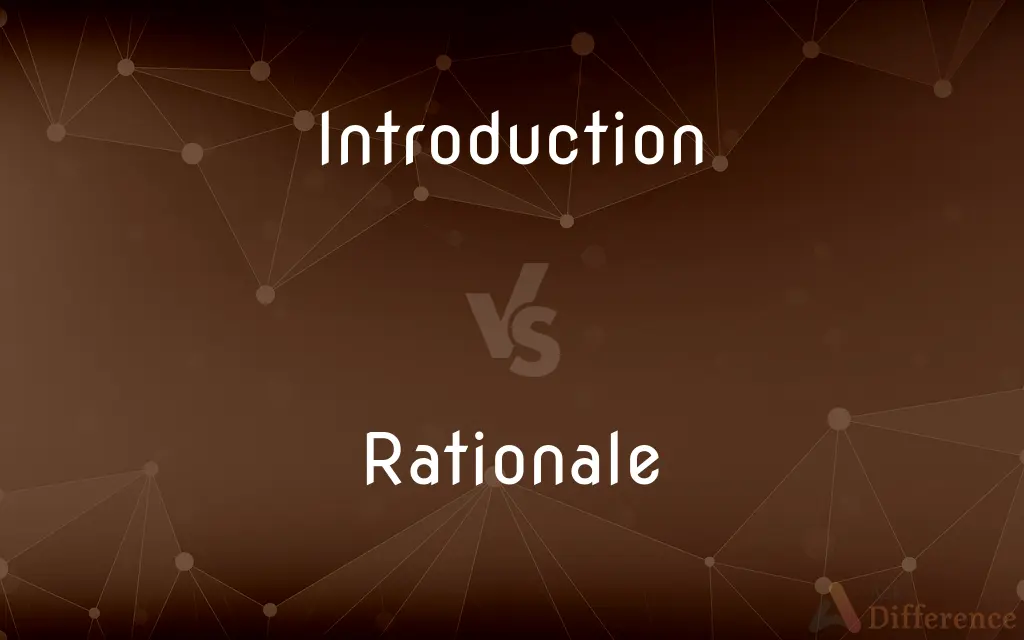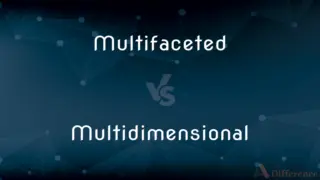Introduction vs. Rationale — What's the Difference?
By Fiza Rafique & Urooj Arif — Updated on April 3, 2024
Introduction presents the overview and purpose of a document, while rationale explains the reasoning and justification behind it.

Difference Between Introduction and Rationale
Table of Contents
ADVERTISEMENT
Key Differences
An introduction and rationale serve critical, yet distinct roles in structuring documents, proposals, or research. An introduction is the initial section that outlines the topic, aims, and structure of the document. It sets the stage, providing readers with a glimpse of what to expect, and often includes background information and the objectives of the work. On the other hand, the rationale goes deeper into the reasoning behind the document's focus. It explains why the topic is important, why the research or project was undertaken, and the specific problem or gap the author intends to address.
While the introduction lays the groundwork by introducing the topic and its significance, the rationale builds on this foundation by delving into the 'why'—the justification for the research or project. The rationale often includes a discussion on the relevance of the topic, the specific questions being addressed, and the theoretical or practical implications of the work. This section is crucial for understanding the context and the motivations driving the research or project, whereas the introduction is more about setting the scene and stating what will be covered.
In academic or research contexts, the introduction might also hint at the research methodology, scope, and limitations, providing a roadmap of the document. The rationale, meanwhile, focuses on substantiating the need for the study, including the significance of the research questions and the expected contributions to the field or practice. It bridges the gap between the general introduction of the topic and the specific details of the research design and objectives.
Moreover, the introduction aims to engage the reader and establish the relevance of the topic to their interests or field of study, while the rationale seeks to convince the reader of the necessity and value of the work. The rationale provides a compelling argument for why the research or project matters, often drawing on existing literature, gaps in knowledge, or practical needs to make its case.
Finally, in professional or business documents, the introduction might briefly touch upon the goals and motivations but remains relatively concise and focused on what the document will cover. The rationale, particularly in proposals or project plans, is where the argument for support, funding, or approval is made. It includes a detailed explanation of the problem, the benefits of addressing it, and why the proposed solution or approach is suitable.
ADVERTISEMENT
Comparison Chart
Definition
Outlines the topic, aims, and structure of the document.
Explains the reasoning and justification behind the focus of the document.
Purpose
Sets the stage and provides background information.
Offers detailed justification for the research or project.
Focus
Broad overview and objectives of the work.
In-depth explanation of the importance and necessity of the work.
In Context
Provides a general introduction to the topic and its significance.
Discusses the relevance, research questions, and implications.
Engagement
Aims to engage and inform the reader about what will be covered.
Aims to convince the reader of the value and necessity of the work.
Compare with Definitions
Introduction
The first section of a document, presenting its topic and objectives.
The introduction clearly outlined the aims of the study.
Rationale
Provides a compelling argument for the necessity of the work.
The project rationale convincingly argued for the need for community gardens.
Introduction
A preliminary part that sets the context for a document or presentation.
Her presentation began with an introduction that caught everyone's attention.
Rationale
Explains the reasons and justification for a study or project.
The rationale delved into the significance of addressing climate change impacts.
Introduction
Broadly indicates the scope and structure of the document.
The report's introduction provided a roadmap of the analysis to follow.
Rationale
Details the background and motivations behind a document's focus.
His thesis rationale articulated the gap in current research.
Introduction
Engages readers by establishing the relevance of the topic.
The book's introduction hooked readers with intriguing questions.
Rationale
Outlines the specific problem or question being addressed.
The grant proposal's rationale explained the urgent need for educational reform.
Introduction
Offers a concise overview of the document’s purpose.
The proposal's introduction succinctly stated its goals and significance.
Rationale
Emphasizes the theoretical or practical implications of the research.
The paper's rationale linked the study's findings to wider societal benefits.
Introduction
The action of introducing something
The introduction of muskrats into central Europe
Issues arising from the introduction of new technology
Rationale
The fundamental reasons for something; the basis
The rationale for dropping the atomic bomb.
Introduction
A formal presentation of one person to another, in which each is told the other's name
He returned to his desk, leaving Michael to make the introductions
A letter of introduction
Rationale
An explanation of the basis or fundamental reasons for something.en
Introduction
A thing preliminary to something else, especially an explanatory section at the beginning of a book, report, or speech
Your talk will need an introduction which states clearly what you are talking about and why
Rationale
A justification or rationalization for something.
Introduction
The act or process of introducing or the state of being introduced.
Rationale
A liturgical vestment worn by some Christian bishops of various denominations.
Introduction
A means, such as a personal letter, of presenting one person to another.
Rationale
An explanation or exposition of the principles of some opinion, action, hypothesis, phenomenon, or the like; also, the principles themselves.
Introduction
Something recently introduced; an innovation
"He loathed a fork.
It is a modern introduction which has still scarcely reached common people" (D.H. Lawrence).
Rationale
(law) an explanation of the fundamental reasons (especially an explanation of the working of some device in terms of laws of nature);
The rationale for capital punishment
The principles of internal-combustion engines
Introduction
A preface, as to a book.
Introduction
(Music) A short preliminary passage in a larger movement or work.
Introduction
A basic introductory text or course of study.
Introduction
The act or process of introducing.
The introduction of a new product into the market
Introduction
A means, such as a personal letter, of presenting one person to another.
David was feeling groggy at his introduction to Sophie, and didn't remember her name.
Introduction
An initial section of a book or article, which introduces the subject material.
This book features a preface by a well-known botanist, and an introduction by the author's mentor at university.
Introduction
A written or oral explanation of what constitutes the basis of an issue.
Introduction
The act of introducing, or bringing to notice.
Introduction
The act of formally making persons known to each other; a presentation or making known of one person to another by name; as, the introduction of one stranger to another.
Introduction
That part of a book or discourse which introduces or leads the way to the main subject, or part; preliminary; matter; preface; proem; exordium.
Introduction
A formal and elaborate preliminary treatise; specifically, a treatise introductory to other treatises, or to a course of study; a guide; as, an introduction to English literature.
Introduction
The first section of a communication
Introduction
The act of beginning something new;
They looked forward to the debut of their new product line
Introduction
Formally making a person known to another or to the public
Introduction
A basic or elementary instructional text
Introduction
A new proposal;
They resisted the introduction of impractical alternatives
Introduction
The act of putting one thing into another
Introduction
The act of starting something for the first time; introducing something new;
She looked forward to her initiation as an adult
The foundation of a new scientific society
He regards the fork as a modern introduction
Common Curiosities
How should the introduction and rationale be structured in a proposal?
The introduction should briefly outline the proposal's goals and significance, while the rationale should offer a detailed argument for the project's necessity and potential impact.
Why is the rationale important in research papers?
It explains the significance of the research, the problem being addressed, and the expected contributions to the field.
What is the purpose of an introduction?
To present the topic, aims, and structure of the document, setting the stage for what follows.
What makes a good introduction in academic writing?
A good introduction in academic writing clearly states the topic, research question or thesis statement, provides background information, and outlines the structure of the paper, engaging the reader's interest in the subject matter.
Is it necessary for the introduction to mention the methodology?
While not always necessary, mentioning the methodology in the introduction can be helpful, especially in research papers, as it gives readers a preview of how the study was conducted or how the project will be executed.
How does a rationale differ from an introduction?
The rationale provides in-depth justification and reasoning behind the document's focus, while the introduction offers a broad overview and objectives.
How detailed should the rationale be?
The rationale should be detailed enough to clearly explain the reasoning behind the choice of topic, its importance, and how it addresses a gap in existing knowledge or a specific problem, including the theoretical or practical implications.
Can a document have a rationale without an introduction?
Typically, documents include both sections, with the introduction setting the stage and the rationale providing deeper justification.
Should the introduction or rationale come first in a document?
The introduction comes first, providing an overview and setting the context for the document. The rationale follows, offering deeper insight into the reasoning and justification behind the work.
How can the rationale influence the reader’s perspective?
A well-crafted rationale can significantly influence the reader's perspective by convincingly arguing the importance of the research or project, its relevance, and potential impact, thereby establishing the value of the work.
Can the rationale include literature review?
Yes, the rationale often includes a literature review to highlight existing gaps in research or knowledge, supporting the necessity and relevance of the current work.
Share Your Discovery

Previous Comparison
Multifaceted vs. Multidimensional
Next Comparison
Hose vs. StockingAuthor Spotlight
Written by
Fiza RafiqueFiza Rafique is a skilled content writer at AskDifference.com, where she meticulously refines and enhances written pieces. Drawing from her vast editorial expertise, Fiza ensures clarity, accuracy, and precision in every article. Passionate about language, she continually seeks to elevate the quality of content for readers worldwide.
Co-written by
Urooj ArifUrooj is a skilled content writer at Ask Difference, known for her exceptional ability to simplify complex topics into engaging and informative content. With a passion for research and a flair for clear, concise writing, she consistently delivers articles that resonate with our diverse audience.
















































